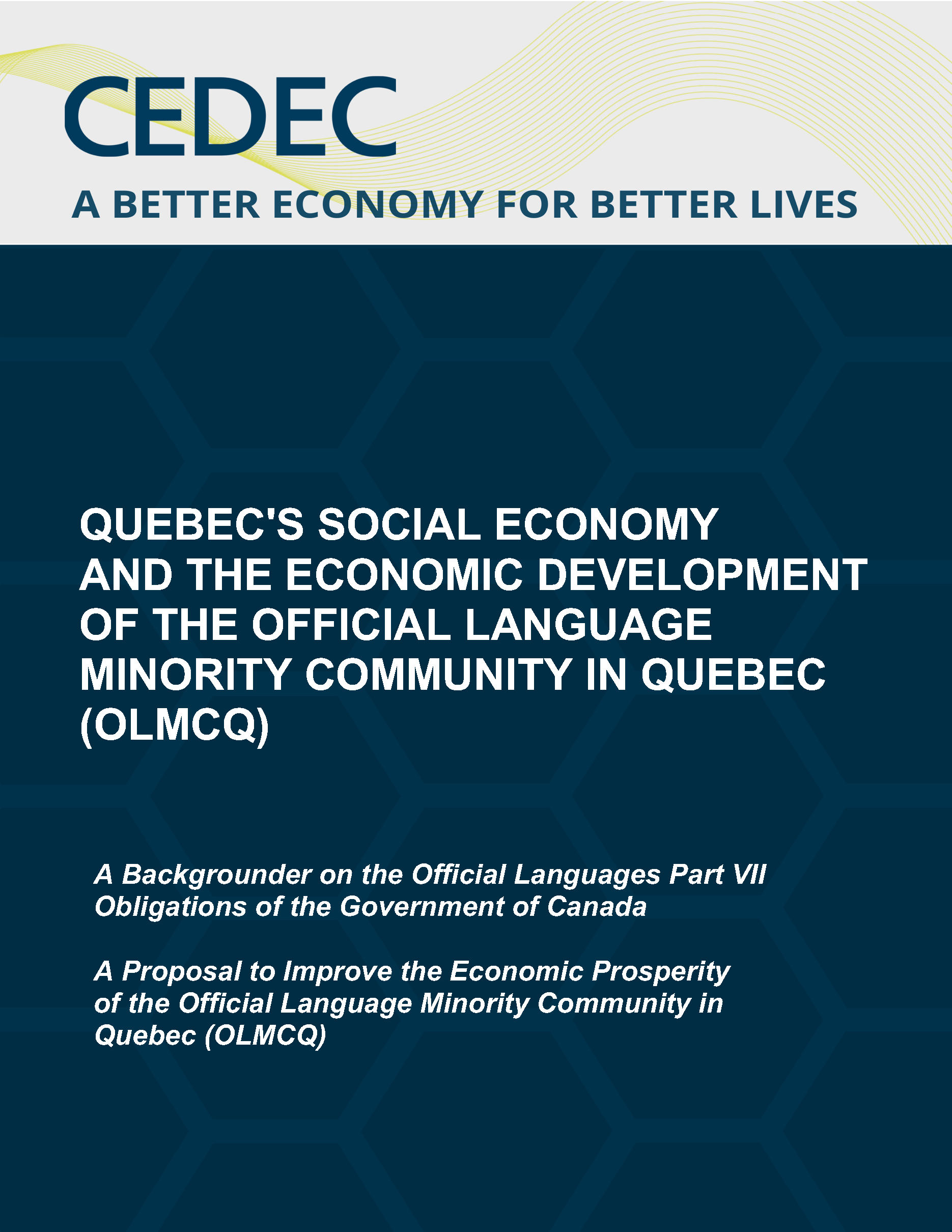Quebec’s Social Economy and the Economic Development of the Official Language Minority Community in Quebec

Quebec's Social Economy and the Economic Development of the Official Language Minority Community in Quebec (OLMCQ)
A well functioning and developing economy is the basis for ensuring individual well-being, strengthened community vitality, and environments which support individual and community growth, development, and social progress.
The economy is a system of interrelated exchange activities determining how scarce resources are allocated to produce, distribute, and trade goods and services for consumption. The economy determines how tangible goods and services (e.g., food products) and intangible goods and services (e.g., knowledge products) are produced and consumed.
Economic development is a process by which a society, and communities in a society, makes choices about prioritizing and allocating scarce resources to (a) enhance individual well-being, (b) strengthen community vitality, and (c) sustain the environment and living spaces within which individuals and communities grow and thrive.
Economic development, therefore, takes place in a shared economic space. Individuals and communities are expected to contribute to and should expect to derive needed benefits from their participation in the shared economy in which they belong.
Economic development is a set of objectives, principles, strategies, and programs designed to improve the economic well-being of communities and individuals. It acts as the basis for social and cultural development and progress.
Economic development generates tangible economic benefits for individuals and communities through an inclusive,interconnected, participatory, and collaborative process. It takes many forms, such as private, community, social, and knowledge-based production and consumption.
Examples of tangible economic results include creating jobs, increasing employment, building and expanding businesses and social enterprises, providing and expanding educational and skills development services, supplying health and employment services, delivering workforce and labour market development services and supports, improving the functioning of private and public markets, increasing productivity, and building secure and efficient supply chains (e.g., the food supply chain).
In a mixed economy like that of Quebec, what underpins economic development, whatever form it takes, is the optimal use of scarce resources to produce goods and services for consumption. As such, economic development seeks to maximize individual well-being and community vitality. This, of course, includes addressing disparities, and maximizing sustainable development.
Developing the social economy is an important form of economic development. It is an important driver of economic development and social progress for the OLMCQ. This is why it has been and will continue to be a key focus of CEDEC’s Collaborative Economic Development Approach.
For example, CEDEC recently backed and guided the creation of the following Collaborative Economic Development Ventures.
- Enhance interprovincial tourism between the Côte Nord and Labrador regions of Quebec and Newfoundland and Labrador.
- Take advantage of international cruise ship passenger traffic to expand experiential tourism in the Magdalen Islands.
- Explore the consolidation and expansion of the provision of health services in Howick and Très-Saint-Sacrement by leveraging the relationships between social enterprise and private sector health care providers.
SNAPSHOT – SOCIAL ECONOMY IN QUEBEC
The social economy counts 11,200 businesses, employs 220,000 people, and generates $48 billion in revenue.
Over 64% of social economy enterprises are outside Montréal and Québec City, including co-operatives, non-profits, and more market-oriented enterprises, like cooperatives.
Source: Government of Canada, Canada Economic Development for Quebec Regions
Based upon its years of economic development experience across Quebec, CEDEC believes the OLMCQ possesses a number of critical assets at the community, regional, and provincial levels that can be leveraged to help develop the social economy in Quebec, in particular the following:
- Human resources, e.g., (a) professional and skilled talent, (b) the English language, (c) high levels of bilingualism
- Organizational resources, e.g., community institutions, groups, and networks
- Technology
- Geography and natural resources
The OLMCQ participation in and contributions to developing Quebec’s economy also enable it to collaborate with Quebec’s Francophone majority to pool and leverage shared natural, linguistic, cultural, technological, and financial resources.
The OLMCQ’s inclusive and collaborative economic development approach is a real advantage because it taps into the public, private, and civil society sectors, taking full advantage of the innovative power of all the core sectors of Quebec society and the community.
Supporting Federal Departments and Agencies with OL Economic Development Obligations
It is imperative for the OLMCQ to actively participate in discussions to help federal departments and agencies like ISED and CED-Q meet their Part VII obligations under the Official Languages Act (OLA). By actively supporting them, the OLMCQ provides the Government of Canada with the information it needs to more effectively enhance the well-being of English-speakers and strengthen the vitality of their community.
Part VII Obligations of GOC Departments and Agencies
Part VII of the OLA gives effect to subsection 16(3) of the Canadian Charter of Rights and Freedoms, i.e., the principle of the protection of minorities and the advancement of the equality of status and use of English and French.
CEDEC believes Part VII obliges federal departments and agencies to take positive measures to support the continuous and sustained advancement of the OLMCQ and the strengthening of its vitality. These measures must be provided directly to the OLMCQ and evaluated against clear “by and for OLMCQ economic development objectives and targets”.
Making the Most of Federal OL Investments in OLMCQ Social Economy Participation
Making optimal use of scarce federal funding resources will maximize benefits for English speakers and the OLMCQ. Maximizing benefits requires systematic coordination and collaboration across the OLMCQ and between the OLMCQ and relevant federal departments and agencies.
As emphasized above, a critical corollary of the above requirement is that the OLMCQ establish by and for OLMCQ economic development objectives and targets which federal departments and agencies can contribute to, thereby fulfilling their Part VII obligations.
OBJECTIVES
- Increase ESCQ participation in and contribution to growing Quebec’s economy and the tangible economic benefits it derives from thiscontribution.
- Leverage Quebec’s economy to address the economic disparities/disadvantages experienced in the ESCQ.
TARGETS
- Create or expand 250 businesses or social enterprises.
- Create or fill 1000 jobs.
- Attract $5M in investment.
- Reduce by 50% the economic disparities experienced by the ESCQ.
It is for this reason CEDEC promotes the above ESCQ Ten Year OLMCQ Economic Development Plan (2023 2033) objectives and targets. These objectives and targets are focused, concrete, and context sensitive. They were designed to have a beneficial impact on English speakers and the OLMCQ. They consider the specific needs of the OLMCQ. Achieving these objectives and targets also requires rigorous progress monitoring and evaluation.
The development of the social economy is a particularly well-suited economic development approach for supporting economic and social progress in the OLMCQ. This is especially true in terms of addressing the economic disparities and disadvantages being experienced by specific subpopulation groups of English-speakers.
As we know from the 2021 census, English-speaking Quebecers faced an unemployment rate four percentage points higher than Francophone Quebecers (10.9% vs. 6.9%). In 2016, English speakers faced an unemployment rate two percentage points higher than Francophone Quebecers (8.9% vs. 6.9%). This means that the difference in unemployment rates doubled between the two census periods. The OLMCQ had a higher unemployment rate than the OLMC outside of Quebec.
Given the above, federal social economy investments should specifically focus on helping the OLMCQ reduce economic disparities by 50% over the next 10 years. The roadmap to achieve this specific target would require the following:
- Leveraging 2021 census data to better understand and validate the factors contributing to ESCQ economic disparity.
- Designing specific OLMCQ initiatives to achieve the above 50% reduction target.
- Conducting analyses to assess the potential impact of proposed initiatives (impact analyses).
- Coordinating the implementation of initiatives assessed to have the desired impact potential.
- Ongoing progress monitoring and continual improvement.
- Evaluating results in a systematic and rigorous manner.
Finally, the Government of Canada would have to make a multi-year, social development funding commitment to support the achievement of this specific target.
With a presence across Quebec, especially in regions where the majority of social economy enterprises are situated, CEDEC is prepared to convene and facilitate discussions across a Collaborative Economic Development ECOSYSTEM composed of OLMCQ community groups, and experts and stakeholders from the Francophone community, relevant federal government departments and agencies, and provincial authorities.
The ECOSYSTEM would define and support the implementation and coordination of a coherent set of social economy investments at the community, regional, and provincial levels. The shared economic development target of the ECOSYSTEM would be to reduce by 50% the economic disparities being experienced by the OLMCQ.

